
We were mentioned on the Today Show this morning! Have a look. Also you can download a high-resolution version of this comic for free, here.

We were mentioned on the Today Show this morning! Have a look. Also you can download a high-resolution version of this comic for free, here.

Let me know if you have any other good ideas. Conversation here.
Links to items (Prices as of November 11, 2013): 1. Slinkies 2. Bouncy balls 3. Parachute men 4. Five pound Gummy Bear 5. Regular Gummy Bears 6. Ladybugs 7. Astronaut ice cream 8. Complete Star Wars Saga 9. Grappling hook 10. Batman costume 11. Marshmellow bazooka
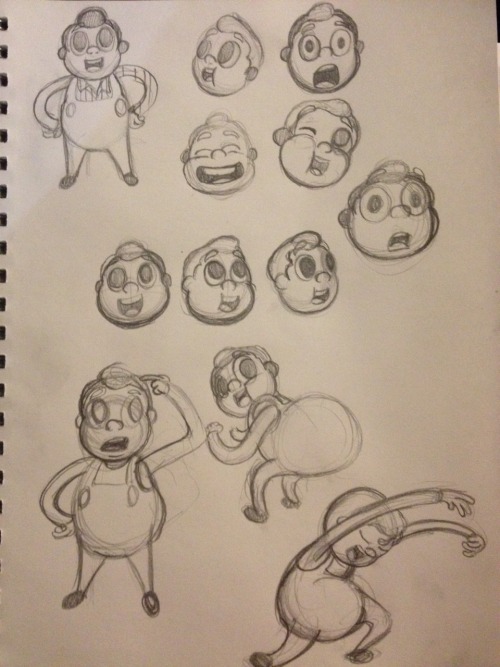
Just working on some character designs for my upcoming project
 EXPECTATION
EXPECTATION
• 5K entry fee: $25
• New running shoes, obviously: $100
• Maybe those Nikes all the cool kids have: +$50
• New running clothes, for motivation: $50
• Maybe from Lululemon so they last, I deserve quality: +$200
• And better socks, I read that socks are almost as important as shoes: $20
• How much are Lululemon socks?: +$50
• I’ll need an app to tell me how to train: $4
• Or maybe I should hire someone to train with me, you know, like a trainer: $100
• And I need to buy the Daft Punk album to run to: $9.99
• And obviously also Beyonce’s entire canon: $50
• I should also start taking regular yoga classes to stay limber: $20
• And I should get a treat after the race, which is in a month, but I should plan it now. Maybe I get a massage! A haircut! A newwwww outfit!: $200
*RECORD SCRATCH / TAKE A CHILL PILL SACHON*
REALITY
• 5K entry fee: $25
• Shoes I have: free
• Clothes I have: free
• Socks I have: free
• 1032840 articles on the internet that tell you how to train for a 5k: free
• Music I have: free
• Stretching in my living room: free
• Working towards a goal and achieving a goal as adequate motivation: free
• Just doing things and not planning them out to be perfect: free
• Putting one foot in front of the other on pavement is the easiest exercise why are you making this so complicated: free
• I’m going to go running right now as soon as I finish this post: free
• Just as soon as I’m done: free
• Okay I’m going: free
• Bye: free
12 Comments
What I value about the improv community is that it’s a community. It’s certainly competitive. Everybody is ambitious and wants to get ahead and succeed, but the nature of the scene is predicated on not singular exceptionalism but ensemble. I feel that ethos is what makes the improv world a very collaborative world.
It’s no mistake that I get a lot more jobs now that my friends are in positions to run their own shows. Everybody in our world is always looking out for each other. There are certainly those people for whom it’s all about them, but those are few and far between in the improv world. It’s more about teams, whether it’s a sketch group or an improv team, everything is based on the ensemble. That began then and continues now.
”Calliefreitagjust all of this.
READ: Acknowledgments. | “If the writing is weak, everything else is bullshit.” Jonathan Franzen | David Sedaris: A big family, at the beach. | I believe this utterly: “We are subject to enough delusions in this life without adding to them the belief that the girl with the name tag is secretly in love with us.” | Lena Dunham: Deliverance. | Jude and I hung out with Laura Jane Faulds and this is what she ate before, during and after. | The trouble with technology is that it eradicates a character’s ability to be lost.
LOOK: The final two pages of the ‘Breaking Bad’ finale screenplay. | Honey and lemon thyme tart on Keke. | A beautiful school. | Whole roasted cauliflower. | Homegrown in Hackney: living off the land in E8, my neighbourhood. | Some baby photos.
THINK: Magic as a technique of the disenfranchised. “It’s something you do when the tools you have available don’t seem like they’re enough.” |”The pendulum has swung from ‘let’s never talk about it and let’s never educate ourselves about it’ to ‘let’s everyone blab about it.’” Social media is redefining depression. | No matter what profession a woman works in, she’s actually in the service profession. | Why do poor people make stupid, illogical decisions to buy status symbols? | “Of course you think what you’ve written is great: You wrote it. But if your work was worth money someone would probably be paying you for it.” |The problem of episodic TV criticism.
LINKNESS: My weekly wrap ups of the best strategy + creativity + marketing reads on Nextness.
I have eaten your scrumptious face, through
the plums of cheeks, juicy recollections
that were in your hippocampus. Remember Kool-Aid in
the icebox and how they rubied your lips? Of course you don’tand which of us always will is, well, obvious. I’m guessing
you were probably thinking you were
saving time by crossing the graveyard to meet your mother
for breakfast at Marty’s Diner. She’s still waiting.Forgive me if I devour her brain too. Those I’ve had already:
they were delicious and ripe with memories. I was
so sweet when I was human, way on the shy side,
and so cold to adventure. Look at me now: ravenous for experience.-David Hernandez

Actors complain a lot about being typecast. Someone always plays the scheming villain ... or the girl next door. But imagine a career that featured roles as the most famous blind space explorer and one of the country's biggest advocates for reading.
That's the story of LeVar Burton. He played Geordi La Forge on "Star Trek: The Next Generation" and hosted the 1980s public television show "Reading Rainbow" to encourage kids to read.
His television show is now a mobile app.
"I grew up in an environment where love of the written word was expected. My mother is a great teacher and she was my first teacher and one of the things that she taught me, by example, was that a personal relationship with the written word is the key to being an informed human being. That there is no thing more powerful than a soul that has a thirst for knowledge."
Listen to the extended version of our conversation:
Plus, we've been singing the Reading Rainbow song around the office all week. We want you to record your own rendition using our new Marketplace voicemail app.
And finally, we've got a quiz based on Burton's two most famous roles. We'll give you a plotline, and you tell us: Is it a Star Trek episode? Or a Reading Rainbow book?
 Sunday night I was walking home from the train, slowly. It was 11 p.m. I was tired. I was going to walk into my apartment, stumble into my room, drop my bag, fall into bed. It was going to be really good. I couldn’t wait.
Sunday night I was walking home from the train, slowly. It was 11 p.m. I was tired. I was going to walk into my apartment, stumble into my room, drop my bag, fall into bed. It was going to be really good. I couldn’t wait.
A few blocks from the station, I noticed there was a man walking a few feet behind me. I was aware of him because I am a woman, and when you are walking in the dark, you notice the other people on the block, and where they are in relation to you. I had been listening to music on the train. I’d pulled one earphone out as I entered into the night, street smarts, safety. When I noticed the man behind me, I took both out. I didn’t turn around but I did turn my head enough to see him in my periphery. Tall, large, broad shouldered. Black. That’s all I got. I kept my pace.
New York recently excerpted an essay from Questlove’s book about all the times people have crossed streets or held purses tighter when they are around him, even in the elevator of his building. He says he understands, he’s a large guy, he must look scary, but it hurts, it must. I don’t want to hurt anyone. I don’t want to speed up when there’s a black man walking behind me, don’t want to instinctively hold my purse tighter. And so I consciously don’t speed up, don’t change my bag to my other arm. Sometimes I walk through the housing projects near my house instead of going around them, for the same reason. I don’t want to talk around them.
We live in a racist society. I have some racist instincts. I want to ignore those instincts, to shut them down.
The man walked behind me for a block, and then we came to a large street where we both stopped to wait to cross. I looked over him and smiled, a smile meant to be friendly and neighborly, meant to make up for the fact that I’d noticed him walking behind me, even though I’d taken pains not to change my behavior.
He was maybe in his late forties or fifties. Friendly eyes, broad smile, dark skin, no hair. He smiled back and kind of laughed, “You are tired,” he said in accented English. African, maybe.
“Oh no is it that obvious? It’s been a long day.”
The light changed and we crossed, still talking. “You have had a long day, like me,” he said. “I am just getting home from work now, I left here at 6:30 a.m.”
“That is a long day!” I said, instantly regretting having complained at all. I had not left my house at 6:30 a.m. I had left my house at 10 a.m., taken the train to the first stop in Manhattan, taken a cab the rest of the way, late.
“I park here at 6:30 a.m., take the train two hours to the Bronx. Work all day. Tonight I saw a friend in Newark after work, he is taking a trip and I will not see him for a long time. So I went to Newark, then back here. I will be back here at 6:30 tomorrow. Every day.”
“What is your job, in the Bronx?” I asked.
“I am the manager of a retail store, clothes and shoes, electronics. I walk around the store, to make sure everyone is doing their job. Sometimes I drive a car, anything I can to make money.”
After that I said, “I work in a restaurant. It’s not so hard. And not so far. And not so early. I shouldn’t complain.”
He said, smiling, “Just get some slippers to put on after work.” I was wearing new boots. They were hurting my feet. He had noticed.
He had been in New York 10 years, came over on a boat from Burkina Faso. “It is a country in West Africa, do you know it?” I nodded, then clarified. “I don’t know much, mostly just that it exists, I’m sorry.”
“Do you have a family?” I asked. I don’t know why I asked. I think I wanted him to say yes, he has four children, they are why he works so much. It would have made me feel better.
“I have no one,” he said. “I just have the work, the commute. It would be nice to have a friend, someone to drink a beer with, talk about the day.” He did not sound like Eeyore; he was not complaining, just stating fact. He also did not sound like he was asking me out, though in retrospect, maybe he was.
Maybe this was my cue to say, “I will drink a beer with you.” Instead I said, “Thank you for talking to me, I hope you get some rest. I won’t complain again.”
He laughed and said, “Just get better shoes!”
And then he was at his car. “I’m Logan,” I said.
“Barry,” he said. “See you on the train,” I said. “Or the street.” I don’t know how to end encounters. We said goodnight and he got into his car, an old town car. It must be the car he drives sometimes.
I’d actually gotten off work at 9:30 p.m., sat at the bar in the restaurant for a shift drink. That’s why I was getting home at 11. I was tired because I’d had a full day the day before, a proper day off with exercise and brunch and friends and whisky. This morning at the restaurant I drank free, very good coffee throughout the day, and got free, very good food midday. I had friends at work that I laughed with. It had been a good, long day.
I still went home and kicked off my shoes and fell into bed. I really was tired, the day really was long. For me. Everything is relative, isn’t it. And then I was out.
photo by david mican
8 CommentsUS home size has fallen a little since the recession, to 201 m2 (2,164 ft2) in 2009. UK house size is relatively small at 76 m2 (818 ft2) while Canadian houses are quite big at 181 m2 (1,948 ft2). For China the data only reflects urban properties, which now average 60 m2 (646 ft2) and have almost doubled in size in the last 15 years.
There are all sorts of reasons for these differences. Wealth levels, urbanization rates, land access and climate all play a part. Nonetheless the scale of the differences is pretty fascinating.
I found this post on house sizes by country via Radiolab, and it asks: How much space is enough? That depends, of course, on how big your family is and what you do (my parents knocked down walls and built additions to their house because they needed space to dance). I live in a small studio apartment, which I think is perfectly fine at the moment, so I agree with what the author of the post, Lindsay Wilson, says here: “In my mind if you have decent ceiling heights, good windows, clever storage and not too much stuff a little space can go a long way.”
1 Comments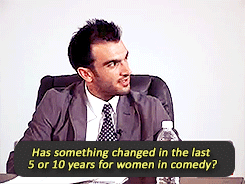
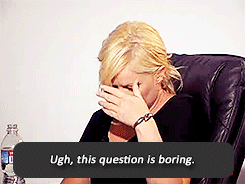
I love this transparency. I would say the same thing.
Oh, Amy Poehler. Never change.
I received lots of emails from you guys this weekend about McDonald’s and Visa’s ridiculous “budgeting” site for employees, which assumes that workers will work two jobs to earn $24,000 a year to get by, don’t have any children, and doesn’t include groceries or transportation costs like gas in its sample monthly budget (not to mention: retirement). The Youtube video was made by fast food workers who are fighting for fair wages.

The site also includes an introduction video, which I had to stop watching after the host started using a “latte factor” example and talked about how workers shouldn’t be spending $1 a day on gum and candy bars, because it all adds up.
Also, I don’t know what kind of adequate health insurance McDonald’s knows about that costs $20 a month, but if they can give that to their workers, it’ll do a lot more for them than this budgeting site will.
23 Comments At our family reunion last week, I asked my (many) cousins how they would spend $50:
At our family reunion last week, I asked my (many) cousins how they would spend $50:
• “Hmmm, I don’t know. Oh wait—yes I do!! An airsoft machine gun!” (10-year-old)
• “Suckers” (five-year-old)
• “Candy!” (seven-year-old)
• “New pair of shoes. No, a new hair straightener!” (13-year-old)
• “A sweet date for my girlfriend” (17-year-old)
• “Maybe a book?” (11-year-old)
• “A new belt buckle or cowboy boots or buy a stock” (17-year-old)
• “Some Playmobil or Lego” (nine-year-old)
• “Well, I’m saving for a camera” (12-year-old)
• “Some clothes or something (including shoes) or headbands or throw a party for my friends” (nine-year-old)
• “Buy a whole bunch of pre-filled water balloons and throw them at the manager of the store” (15-year-old)
• “I’d go to the candy shop” (11-year-old)
Rachel S. would buy groceries.
4 Comments
In one of their financial models, Dudley’s students proposed all community college students pay 1.5 percent of their incomes while all four-year public university students pay 3 percent — both for the duration of 20 years after graduation. The pilot program committee will likely choose one university and one community college to experiment with the details, Dudley said.
Oregon is exploring an inventive way for students to fund their educations at community colleges and four-year public universities in the state: Free tuition in exchange for paying a small percentage of their adjusted gross incomes into a special fund for, according to one proposal, a 20-year time period. This would allow students to graduate without a heavy burden of student debt in front of them. My student loan payments are definitely higher than 3 percent of my income at the moment, so, in my view, this would be more than manageable.
The plan, which is called “Pay it Forward, Pay it Back,” was unanimously passed by Oregon’s Senate last week, and approved by the House. A committee is being formed to develop a pilot program, and the legislature will decide whether or not implement the program in 2015.
This kind of creative thinking is very much needed right now:
According to quarterly data compiled by the Federal Reserve Bank of New York, student loan debt has been the biggest driver of borrowing since the Great Recession ended in June 2009. Student loans reached $986 billion in the first three months of this year. That’s up from $675 billion in the second quarter of 2009.
Photo: saml123
1 Comments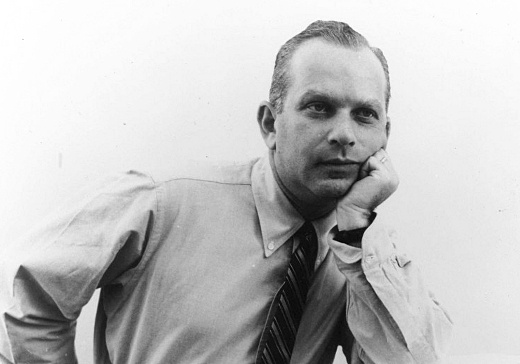
5/15/47
Dear ___________ :
Our agency is getting big. That’s something to be happy about. But it’s something to worry about, too, and I don’t mind telling you I’m damned worried. I’m worried that we’re going to fall into the trap of bigness, that we’re going to worship techniques instead of substance, that we’re going to follow history instead of making it, that we’re going to be drowned by superficialities instead of buoyed up by solid fundamentals. I’m worried lest hardening of the creative arteries begin to set in.
There are a lot of great technicians in advertising. And unfortunately they talk the best game. They know all the rules. They can tell you that people in an ad will get you greater readership. They can tell you that a sentence should be this short or that long. They can tell you that body copy should be broken up for easier reading. They can give you fact after fact after fact. They are the scientists of advertising. But there’s one little rub. Advertising is fundamentally persuasion and persuasion happens to be not a science, but an art.
It’s that creative spark that I’m so jealous of for our agency and that I am so desperately fearful of losing. I don’t want academicians. I don’t want scientists. I don’t want people who do the right things. I want people who do inspiring things.
In the past year I must have interviewed about 80 people – writers and artists. Many of them were from the so-called giants of the agency field. It was appalling to see how few of these people were genuinely creative. Sure, they had advertising know-how. Yes, they were up on advertising technique.
But look beneath the technique and what did you find? A sameness, a mental weariness, a mediocrity of ideas. But they could defend every ad on the basis that it obeyed the rules of advertising. It was like worshiping a ritual instead of the God.
All this is not to say that technique is unimportant. Superior technical skill will make a good ad better. But the danger is a preoccupation with technical skill or the mistaking of technical skill for creative ability. The danger lies in the temptation to buy routinized men who have a formula for advertising. The danger lies In the natural tendency to go after tried-and-true talent that will not make us stand out in competition but rather make us look like all the others.
If we are to advance we must emerge as a distinctive personality. We must develop our own philosophy and not have the advertising philosophy of others imposed on us.
Let us blaze new trails. Let us prove to the world that good taste, good art, and good writing can be good selling.
Respectfully,
Bill Bernbach
The BBC recently asked two Ivory Coast residents—one middle class, living on $20 a day, and one surviving just above the poverty line at $2 a day—how they get by.
The spending breakdowns are fascinating. Both men, for example, spend way more on food than on rent.
More interesting is what they have to say for themselves:
“I cannot say I’m wealthy but I cannot say I’m poor because if I’m living it means I can sustain my life,” says Konan Kouassi Vercruysses, who makes between $240 and $530 a month running a phone booth with his cousin — two to five times the country’s median income.
“I don’t like the word poor because if you have this in your mind it brings you down.”
1 Comments Consumer spending drives most of the growth in the American economy. And that spending depends on having enough people with enough disposable income that they're willing and able to spend. It's a group of people we like to call the Middle Class. Chances are you consider yourself one of them. But how do we decide who qualifies as middle class, and how much stuff it takes to be part of it?
Consumer spending drives most of the growth in the American economy. And that spending depends on having enough people with enough disposable income that they're willing and able to spend. It's a group of people we like to call the Middle Class. Chances are you consider yourself one of them. But how do we decide who qualifies as middle class, and how much stuff it takes to be part of it?

CalliefreitagI still miss the sign.

641 S Street, NW
Wonderbread Factory looking good in Shaw.

Tougher times in 2011:

 Things I Notice
Things I Notice
Your shoes
Your pants
Your shirt
Your jacket
Your sign (too many details? Not enough details? Is it done in a bic pen you found on the ground or is there some sharpee action going on there?)
Your teeth (too white?)
If you say you’re a veteran, do you look like you could be a veteran
If you say you’re a veteran, do you look like you may have been dishonorably discharged
If you say you’re a veteran, what war, just wondering
If you say you have kids, do you really have kids
If you say you lost your job, were you really fired
How apologetic are you to be asking for money
How embarrassed are you to be asking for money
Are you mentioning god too much
“Fellow Christians”
“Find it in your heart”
What else could I spend this dollar on
![]()
Things I Want to Notice
You’re a human asking for another human for help
Can I help you
11 CommentsCalliefreitag"Meanwhile, you have to prepare yourself, be very revolutionary-which at your age means to learn a lot, as much as possible, and always be ready to support just causes."
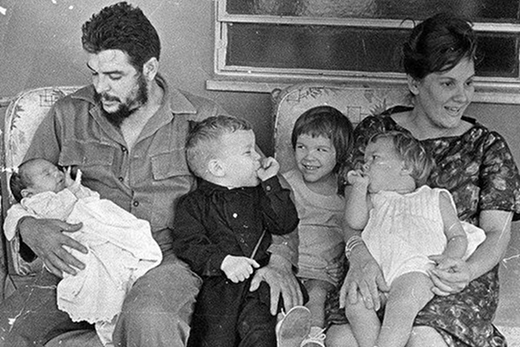
[1965]
To my children
Dear Hildita, Aleidita, Camilo, Celia, And Ernesto,
If you ever have to read this letter, it will be because I am no longer with you. You practically will not remember me, and the smaller ones will not remember me at all.
Your father has been a man who acted on his beliefs and has certainly been loyal to his convictions.
Grow up as good revolutionaries. Study hard so that you can master technology, which allows us to master nature. Remember that the revolution is what is important, and each one of us, alone is worth nothing.
Above all, always be capable of feeling deeply any injustice committed against anyone, anywhere in the world. This is the most beautiful quality in a revolutionary.
Until forever, my children. I still hope to see you.
A great big kiss and a big hug from,
Papa
--------------------
February 15. 1966
Dearest Hildita,
I am writing you now, although you’ll receive this letter much later. But I want you to know that I am thinking about you and I hope you’re having a very happy birthday. You are almost a woman now, and I cannot write to you the way I write to the little ones, telling them silly things or little fibs.
You must know that I am still far away and will be gone for quite some time, doing what I can to fight against our enemies. Not that it is a great thing, but I am doing something, and I think you will always be proud of your father, as I am of you.
Remember, there are many years of struggle ahead, and even when you are a woman, you will have to do your part in the struggle. Meanwhile, you have to prepare yourself, be very revolutionary-which at your age means to learn a lot, as much as possible, and always be ready to support just causes. Also, obey your mother and don’t think that you know it all too soon. That will come in time.
You should fight to be among the best in school. The best in every sense, and you already know what that means; study and revolutionary attitude. In other words: good conduct, seriousness, love for the revolution, comradeship, etc.
I was not that way at your age, but I lived in a different society, where man was an enemy of man. Now you have the privilege of living in another era and you must be worthy of it.
Don’t forget to go by the house to keep an eye on the other kids and advise them to study and behave themselves. Especially Aleldita, who pays a lot of attention to you as her older sister.
All right, old lady. Again I hope you are very happy on your birthday. Give a hug to your mother and to Gina. I give you a great big strong one to last as long as we don’t see each other.
Your Papa
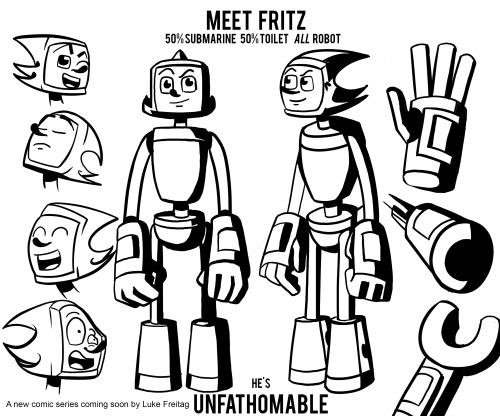
Here’s another character design for my upcoming comic series UNFATHOMABLE.
I’m really excited about Fritz, for a number of reasons.

Drawing challenge day 06: Favorite Book character
The Little Prince!
He teaches you about life, loss, and how to truly be a spaceman.

Sir: If you occasionally buy this product, please kindly resend this letter to the World Human Right Organization. Thousands people here who are under the persicution (sic) of the Chinese Communist Party Government will thank and remember you forever.
This is from a letter a woman found stuffed inside a package of Halloween decorations sold at a Kmart in Oregon, which had apparently traveled 5,000 miles from a labor camp in China, according to The New York Times. A 47-year-old former labor camp inmate named Zhang said he had written the letter, and that it was one of 20 letters he had written and stuffed in packages headed West:
Barred from having pens and paper, Mr. Zhang said he stole a set from a desk one day while cleaning a prison office. He worked while his cellmates slept, he said, taking care not to wake those inmates — often drug addicts or convicted thieves — whose job it was to keep the others in line. He would roll up the letter and hide it inside the hollow steel bars of his bunk bed, he said.
His efforts worked—the letter has been receiving international media attention. [via]
0 Comments Sesame Street has launched a project to support kids with an incarcerated parent. Why is this needed perhaps you are wondering. Well: There are 2.7 million kids in the U.S. with at least one parent in prison. Great job, America. Really excellent job.
Sesame Street has launched a project to support kids with an incarcerated parent. Why is this needed perhaps you are wondering. Well: There are 2.7 million kids in the U.S. with at least one parent in prison. Great job, America. Really excellent job.
Graydon Gordian talked to Carol F. Burton of Centerforce, an org that helps families impacted by incarceration, about why this new initiative is so important. (“Some [kids] are doing pretty well. Others are faring poorly. We don’t even know what’s happening with a significant group of them. They fall under the responsibility of no public institution – none that provide support or care as we remove their parents from their home.”)
2 CommentsCalliefreitag"And that’s it, that’s my own three-word advice: Do awesome stuff."

The best advice and the worst advice I’ve ever gotten were three words long.
The best advice was “avoid the treadmill”. It was 2003. I was coming to the end of a master’s degree in a subject (political philosophy) and a city (London) I was ready to leave. I was 22 years old.
Rebecca was the advisor at the community college student newspaper where I worked between and after classes three years earlier, and we had—pre-Facebook!—stayed in touch through undergrad and now grad school. She was visiting London and invited me to dinner.
I had two months left until I completed my master’s and my visa expired. I had no idea what I was going to do, or even what I wanted to. There was the prudent thing, moving back to the States, getting a job, starting a career, buying a house, leasing a Camry, nothing wrong with that.
There was also, however, something I had come across two weeks earlier while drinking wine and Googling Nordic underwear models: Universities in Scandinavia are free.
I told Rebecca all this (minus the wine), and that I had found a program in Aarhus, Denmark—a master’s degree that as soon as I said it out loud I realized sounded even vaguer and more destitution-promoting than the master’s I already had.
“European studies!” I said.
Rebecca asked if I had ever been to Denmark, and what my logic was for considering this an option. I admitted I had none, it just sounded cool and I wanted to try it.
“So I have to decide,” I said. “Prudent, or Denmark.”
“Mike,” she said. “This is an easy one: Avoid the treadmill.”
I knew what she meant, but I asked her to elaborate anyway.
“You have a whole life of working ahead of you. Going home is easy. Getting a job is easy. Going to, whatever country this is, Denmark, making an impulsive decision and living with it for two whole years, that’s hard. This is what your twenties are for. As you get older, the hard stuff only gets harder.”
“And the easy stuff gets easier?” I said.
“No,” she said. “That gets harder too.”
![]()
The way stress works is, when you’re presented with a threat, your body produces adrenaline, a kind of internal crystal meth, that gives you the energy to escape or fight or defend yourself or pull an all-nighter or whatever you need to do to neutralize the threat. While the adrenaline is pumping, other functions—sleep, appetite, afternoon horniness—shut down while your body gives you enough energy to deal with the crisis at hand.
This makes sense, right? If you’re living in an environment where every once in awhile you need to run away from a lion, chase a gazelle, defend your village from the next tribe over, you need a system that takes precedence over everything else. You can’t be stalking a mammoth and suddenly be overcome with the urge to pee.
The problem, of course, is that stress isn’t something that only gets activated by extreme, once-a-month stressors. It’s something you activate yourself, something that reacts not to the objective threat level but to what you perceive as a threat.
These days, we don’t get hunted by lions all that often, but we do get hunted by bosses, partners, deadlines, bills, kids, early closing hours, late public transport, insomnia, status, proliferating Netflix queues. Since our bodies can’t differentiate between a lion and an overdue car payment, adrenaline becomes a kind of routine. We coast on it 9-to-5, deadline to deadline, and squeeze the tube even more over the weekend to get us through the neighborhood barbecue, the water park outing with the kids, the difficult conversation with the wife.
Like everything else that’s good for you once a month, adrenaline when you use it every day is a kind of poison. They do autopsies on people who were constantly stressed out and their pituitary gland is the size of a turkey baster. Constantly suppressing your immune system, ignoring your appetite, boosting your heart rate, these things are like fast-forwarding the aging process. People who are constantly stressed out are more likely to get cancer and strokes. Stressed out kids end up shorter as adults. When you turn off everything but your emergency generator, the normal stuff rusts and brittles.
Robert Sapolsky, the guy who I’m basically stealing all these insights from, studies stress in baboons in the wild. He says he can tell the difference between short-lifespan baboons and long-lifespan baboons by one thing: How do they act when they see a lion 200 feet away?
Short-lifespan baboons, the ones that that use adrenaline the way we use drip coffee, see the lion in the distance and immediately activate their stress response. A lion! Shit! What am I going to do?!
The un-stressed baboons—the ones eating fresh berries and complaining about the morals of the next generation of baboons into their twilight years—they see the same lion and go “meh, he’s 200 feet away. He’s yawning, grooming, he doesn’t seem all that interested in me” and they stay calm. No adrenaline, no panic. They keep an eye on the lion—they’re baboons, they’re not stupid—but they don’t get all adrenaliney until there’s a genuine threat.
We all know that refrigerator-magnet phrase, “Give me the serenity to accept the things I can’t change, the courage to change the things I can, and the wisdom to know the difference,” or however it goes. For me, it’s never been the courage that’s hard, it’s the serenity.
![]()
In 2004, I applied to the master’s program in Denmark. I filled out the application, photocopied my old diplomas, wrote my admissions essay, mailed them off. Two months later, a letter came saying I was accepted. And then I started freaking out.
I don’t speak Danish. I don’t know anyone in the whole country. Where am I going to live? What am I going to do for living expenses? All of a sudden, the treadmill started looking pretty good.
It was five months since my conversation with Rebecca, and three months since my U.K. visa expired and I had moved back home to Seattle. I was working (OK, temping) at Microsoft as a copy editor, and living with my parents.
Steve was my boss at Microsoft. Former journalist, weekend kickball player, suburban dad, never missed a day of work or a misspelled word or a subordinate’s birthday. Totally a long-lifespan baboon.
And he gave me the worst advice I’ve ever gotten: “Trust your gut.”
He said it after I went into his office and told him everything I just told you: I was accepted to this program in Denmark and I had no criteria by which to judge whether this was a good idea.
“You don’t need criteria for these sorts of decisions,” he said. “It’s all about doing what feels right.”
It may not have been obvious to Steve, but I am firmly the first baboon. I see a lion—an unpaid bill, an unread e-mail, an uncalled acquaintance—not even 200 feet away, a mile away, on the horizon, barely visible to the naked eye, and my adrenaline spikes. The year I was living in London, I couldn’t get to sleep one night because I suddenly remembered I had forgotten to book a flight home for Christmas. It was May.
Like every American, I heard this stock advice—“Trust your gut”, “Be true to yourself”, “Follow your instincts”—all the time growing up, variations on the same Hollywood catechism, the pledge of allegiance to individuality we get installed on first bootup.
And the thing is, this advice isn’t necessarily bullshit. There are probably people out there whose instincts are all kindness and extroversion, whispering directives of generosity and serenity into their ear. Some people, I imagine, search their innermost desires and find the charm of a CEO, the selflessness of a Mormon.
I search mine and find the pessimism of an amputee, the selfishness of a marauder. I am constantly at war with my instincts, trying to project-manage away the anxiety, the me-firstism, the adrenaline they send me. Trusting my gut, really doing what I felt, would mean curling up into a ball until all my obligations—jobs, friends, family, personal hygiene—gave up and disappeared.
For Steve, trusting his gut would have meant doing the right thing. For me, it would have meant doing nothing at all.
After my meeting with Steve, I came home and I made a list: Stuff to Sort Out Before You Move To Denmark. Spend one hour every morning before work studying Danish. Post concerns on university message boards. Find potential friends in Aarhus on social media (OK, gay personals sites), talk to them on IM. Find out what “European studies” means.
It was work, but it worked. Six months later, I moved to Demark and started my program. Two years later, I graduated and got a job in Copenhagen. Four years after that, I moved to Berlin. Two years after that, I’m still here.
And yes, I’m still anxious. I still have to remind myself that my gut is cruel and manipulative, and should not be trusted with any decisions that affect us both. But just as amazingly, I still feel like I’m avoiding the treadmill. I work at an NGO that sends me to weird conferences and exotic countries. Back home, I rent, I bike, and don’t own anything I need to insure.
Moving to Denmark is the best thing I ever did. Not because I loved everything about it, or because it made me a less anxious person, or because I assimilated into it like a mermaid to a fairy tale. I didn’t.
It’s the best thing I ever did because for me, it was more awesome than staying in my hometown, moving commas around for a living, commuting in that Camry.
And that’s it, that’s my own three-word advice: Do awesome stuff.
Maybe it’s not moving to Europe, maybe it’s learning to play the piano, speaking Esperanto, writing a novel, becoming a professional wrestler, who cares. Find things you will someday want to brag about, things that would impress you if someone else did them, and do them.
If you’re like me, the furrowed-brow baboon worrying about his pension in his early 20s, find out what your awesome is and make a plan for doing it. Rules, lists, indicators, push notifications, whatever helps you pull rank on the lies your gut tells you.
If you’re not like me, if you’re the baboon polishing an apple and smoking a cigarette while the lion in the distance walks steadily you-ward, ignore me. I have no idea how your brain works. Just stop telling the rest of us to listen to ours.
Maybe I’m supposed to say that it’s really about being able to tell how far away the lion is, shrinking your pituitary gland through meditation or Pilates or multivitamins or whatever. But nothing I’ve done has made me any less anxious, no achievement has led me to that serenity I read on the bumper stickers. With stress inevitable, anxiety unavoidable and awesomeness finite, all I can do is work on tapping the one I might be running out of.
And if I’m in the middle of doing so and someone tells me to be myself, trust my gut, follow my heart, I have a built-in answer: “I can do better than that.”
Michael Hobbes lives in Berlin. He blogs at rottenindenmark.wordpress.com. Photo: David Berkowitz
9 Comments
I couldn’t sleep last night, so around two in the morning I took half a Sominex tablet and put on the most recent podcast episode of Freakonomics (public radio voices are soothing). I ended up listening to the entire 40-minute episode because there was so much to think about and unpack.
The episode’s main guest was a professor at Cornell named Michael Lynn who has written more than 50 academic papers on tipping that examines a long list of things, such as:
• Are Christian/religious people poor tippers? (Yes.)
• Does putting candy next to the tip jar increase tipping? (Yes.)
• Do women get tipped better than men? (Women get tipped better by men and men get tipped better by women.)
• Who gets tipped better, blonds or brunettes? (Blonds.)
• Do people tip better when their server touches them (like, on the shoulder)? (Yes.)
• Is race a factor? (Yes.)
Because race is a factor that can result in a form of discriminatory tipping, Lynn says that tipping should be outlawed. The Freakonomics team talks to a lawyer named Justin Swartz about whether or not such a case would be viable. (Yes.)
Photo: omello_pics
14 Comments